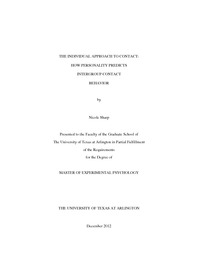
ATTENTION: The works hosted here are being migrated to a new repository that will consolidate resources, improve discoverability, and better show UTA's research impact on the global community. We will update authors as the migration progresses. Please see MavMatrix for more information.
Show simple item record
| dc.contributor.author | Sharp, Nicole | en_US |
| dc.date.accessioned | 2013-03-20T19:13:56Z | |
| dc.date.available | 2013-03-20T19:13:56Z | |
| dc.date.issued | 2013-03-20 | |
| dc.date.submitted | January 2012 | en_US |
| dc.identifier.other | DISS-12046 | en_US |
| dc.identifier.uri | http://hdl.handle.net/10106/11659 | |
| dc.description.abstract | Personality has been shown to be associated with prejudice levels and intergroup contact has been shown to reduce negative outgroup attitudes and discrimination, but until now the motivating factors that encourage naturalistic contact have not been examined. Participants were recruited from undergraduate introductory psychology courses and partook in a two-part study. During phase 1 of the study, participants completed personality measures as well as intergroup contact and prejudice scales. In the second phase of the study participants rated and selected potential future interaction partners based on an evaluation of short profiles. Results indicated that the Cultural Empathy subscale of the MPQ was the strongest predictor of prejudice. Outgroup approach behavior was not predicted by the MPQ variables, but positive ingroup evaluations were predicted by Cultural Empathy, Open Mindedness, and Emotional Stability. This suggests that individuals more prone to understanding others on an affective level will be less prejudiced than others. | en_US |
| dc.description.sponsorship | Kenworthy, Jared B. | en_US |
| dc.language.iso | en | en_US |
| dc.publisher | Psychology | en_US |
| dc.title | The Individual Approach To Contact: How Personality Predicts Intergroup Contact Behavior | en_US |
| dc.type | M.S. | en_US |
| dc.contributor.committeeChair | Kenworthy, Jared B. | en_US |
| dc.degree.department | Psychology | en_US |
| dc.degree.discipline | Psychology | en_US |
| dc.degree.grantor | University of Texas at Arlington | en_US |
| dc.degree.level | masters | en_US |
| dc.degree.name | M.S. | en_US |
Files in this item
- Name:
- Sharp_uta_2502M_12046.pdf
- Size:
- 352.7Kb
- Format:
- PDF
This item appears in the following Collection(s)
Show simple item record


